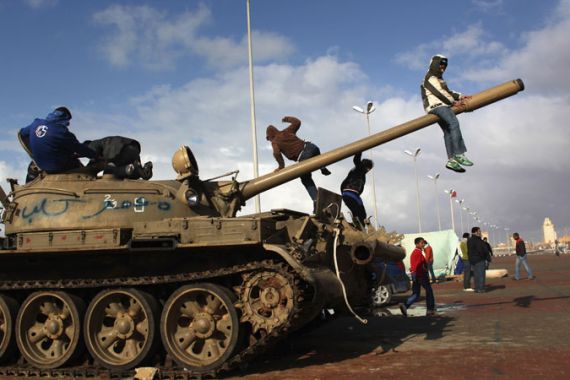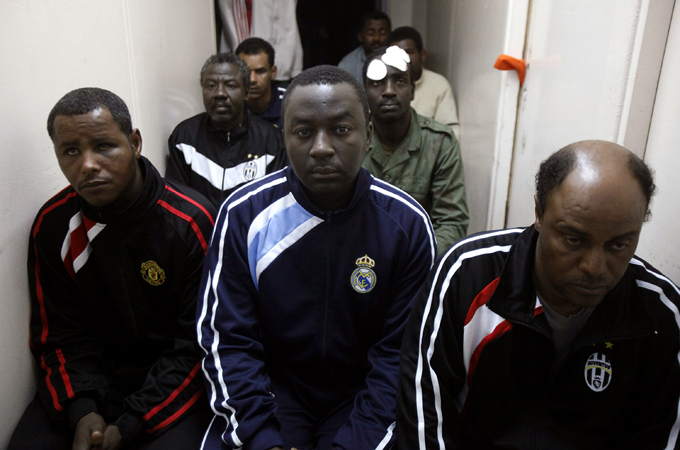Gaddafi blames al-Qaeda for revolt
Embattled Libyan leader says protesters being manipulated as pro- and anti-government forces clash across the country.

Muammar Gaddafi, Libya’s leader, has said that al-Qaeda is responsible for the uprising against him, amid attacks by pro-Gaddafi forces against anti-government protesters in several cities.
On Friday, tens of thousands gathered at cities in the country’s east controlled by anti-Gaddafi forces for Friday prayers, expressing their desire for Gaddafi to leave office.
In a speech made via telephone and aired on state television on Thursday, Gaddafi claimed that the protesters were young people who had been manipulated by Osama bin Laden, al-Qaeda’s leader, and were acting under the influence of hallucinogenic drugs.
| LIVE BLOG |
 |
As he spoke, troops loyal to Gaddafi launched a counter-offensive on Thursday against anti-government protesters, striking at two cities near the capital, Tripoli.
The worst violence was seen in the town of Az Zawiyah, about 50km west of Tripoli, where troops opened fire with automatic weapons and an anti-aircraft gun on a mosque where protesters had been taking shelter.
On Friday, witnesses in the city told Al Jazeera that anti-government protesters had seized four tanks and weapons from a military barracks, and that they were prepared to fight to hold on to the city.
In his speech on Thursday, Gaddafi argued that he was a purely “symbolic” leader with no real political power, and that citizens had “no reason to complain whatsoever”. He hinted that he would be prepared to raise salaries, but warned that protesters would be tried in the country’s courts. [The entire speech is available here.]
On Friday, state television announced that every family in Libya would receive 500 dinars ($400), and that wages for some categories of public sector workers would increase by 150 per cent.
Our correspondent in eastern Libya reported on Friday that army commanders who had renounced Gaddafi’s leadership had told her that military commanders in the country’s west, which Gaddafi still largely maintains control over, were beginning to turn against him.
They warned, however, that the Khamis Brigade, an army special forces brigade that is loyal to the Gaddafi family and is equipped with sophisticated weaponry, is currently still fighting anti-government forces.
Pro-democracy protesters attacked
On Friday morning, our correspondents reported that the town of Zuwarah was, according to witnesses, abandoned by security forces and completely in the hands of anti-Gaddafi protesters. Checkpoints in the country’s west on roads leading to the Tunisian border, however, were still being controlled by Gaddafi loyalists.
In the east, similar checkpoints were manned by anti-Gaddafi forces, who had set up a “humanitarian aid corridor” as well as a communications corridor to the Egyptian border, our correspondent reported.
Fierce clashes were reported from various cities in the country on Thursday. Some residents of Az Zawiyah fought back against army troops with hunting rifles. A doctor at a field clinic set up at the mosque that came under attack there told the Associated Press news agency that he saw the bodies of 10 people, in addition to around 150 injured people.
Witnesses told Al Jazeera the deatht toll in the violence there estimated to be close to 100.
 |
| Follow more of Al Jazeera’s special coverage here |
Thousands massed in Az Zawiyah’s Martyr’s Square after the attack, calling on Gaddafi to leave office, and on Friday morning, explosions were heard in the city. Witnesses say pro-Gaddafi forces were blowing up arms caches, in order to prevent anti-government forces from acquiring those weapons.
Clashes were also reported in the city of Misurata, located 200km east of Tripoli, where witnesses said a pro-Gaddafi army brigade attacked the city’s airport with mortars and rocket-propelled grenades.
They told Al Jazeera that pro-democracy protesters had managed to fight off that attack. “Revolutionaries have driven out the security forces,” they said, adding that “heavy machine guns and anti-aircraft guns” had been used against them.
Mohamed Senussi, a resident of Misurata, said calm had returned to the city after the “fierce battle” near the airport.
“The people’s spirits here are high, they are celebrating and chanting ‘God is Greatest’,” he told the Reuters news agency by telephone.
Another witness warned, however, that protesters in Misurata felt “isolated” as they were surrounded by nearby towns still in Gaddafi’s control.
Protesters and air force personnel who have renounced Gaddafi’s leadership also overwhelmed a nearby military base where Gaddafi loyalists were taking refuge, according to a medical official at the base. They disabled air force fighter jets at the base so that they could not be used against protesters.
Similar clashes between pro- and anti-government forces were also reported on Thursday in the towns of Sabha in the south and Sabratha, near Tripoli.
In Tripoli itself, witnesses said security forces had fired upon residents of the Tajoura neighbourhood.
Protesters control east
Pro-democracy protesters appear to remain in control of much of the country’s eastern coastline, running from the Egyptian border, through to the cities of Tobruk and Benghazi, the country’s second largest city.
They also say they are in control of the western cities of Misurata and Zuwarah. Libyan army forces in many cities in the country’s east say that they stand with the anti-government forces against Gaddafi.
 |
| Protesters in Benghazi have held people they claim are mercenaries contracted by Gaddafi [Reuters] |
Pro-democracy protesters say they have established committees to manage the affairs of the cities they are in control of.
Our correspondent reported that army commanders had told her that there were “cracks [appearing] in the whole system that Gaddafi has put in place and his whole grip in power is melting away by the hour”.
She said that pro-democracy protesters in the east had overrun military barracks and now had access to heavy weaponry.
On Thursday, about a dozen people were held in Benghazi by pro-democracy protesters on charges of behind mercenaries working for Gaddafi.
Tripoli, the capital, meanwhile, remains under lockdown, amid reports that protesters have called for anti-government forces to march on the city after Friday prayers.
Libya has been in the grip of turmoil since anti-Gaddafi protests began on February 15. Two days later, the government launched a violent crackdown on protesters, with witnesses reporting that mercenaries had been hired to patrol the streets and fire on citizens indiscriminately with machine guns and heavy weapons.
The use of air attacks against civilian targets has also been reported by witnesses and air force personnel who have refused to carry out those orders.
Security forces have also been launching raids on homes and firing into the air on the streets of Tripoli. A witness told Reuters that security forces had also raided a hospital, searching for injured anti-government protesters.
Violence has ramped up after Gaddafi appeared on state television on Tuesday calling on his supporters to take back the streets and “cleanse” Libya.
Gaddafi increasingly isolated
Gaddafi, who has ruled Libya for 41 years, is growing increasingly isolated both from foreign governments, but also from elements within his government and military.
|
|
On Thursday Ahmed Gadhaf al-Dam, a cousin who is one of Gaddafi’s closest aides, announced that he was renouncing Gaddafi’s leadership in protest against “grave violations to human rights and human and international laws”.
Al-Dam is one of the highest level renouncals to hit the regime, with many ambassadors, as well as the justice and interior ministers, either resigning or announcing that they are standing with protesters. The country’s chief prosecutor and chief judicial investigator have also resigned.
Mustafa Abdel Galil, who earlier resigned as justice minister, spoke to Al Jazeera at a meeting of tribal leaders and representatives of eastern Libya in the city of Al Baida. That meeting was also attended by military commanders who refused orders to fire on protesters.
“We want one country. There is no Islamic emirate or al-Qaeda anywhere. Our only aim is to liberate Libya from this regime and then people choose the government they want.” Abdel Galil said.
He warned that Gaddafi has biological and chemical weapons, and will not hesitate to use them.
UN meeting planned
The United Nations Security Council was to hold a meeting on the situation in Libya on Friday, with sanctions the possible imposition of a no-fly zone over the country under Article 7 of the UN charter on the table.
The UN’s highest human-rights body was also holding a special session to discuss what it’s chief had earlier described as possible “crimes against humanity” by the Gaddafi government.
The Swiss government, meanwhile, has ordered a freeze of any assets belonging to Gaddafi in the country. Libya’s foreign ministry has denied that any such assets exist, and said that it would “sue” Switzerland.
The death toll since violence began remains unclear, though on Thursday Francois Zimeray, France’s top human rights official, said it could be as high as 2,000 people killed.
Earlier, Franco Frattini, Italy’s foreign minister, said a number of 1,000 was “credible”. The Paris-based International Federation for Human Rights put the figure at 640 as of Wednesday.
Foreign governments are continuing to evacuate their citizens from the country, with thousands flooding to the country’s land borders with Tunisia and Egypt.